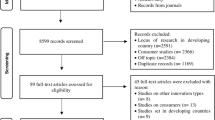Abstract
This paper analyses the governance characteristics of an innovative policy instrument for sustainable forest management in Flanders, namely a mechanism based on social learning and collaborative planning within joint forest management organizations. These organizations have been successful in involving non-industrial private forest owners in managing the transition towards sustainable management in small-scale forestry. Why was this innovative scheme successful? And what are its shortcomings and possible limitations? The hypothesis developed in this paper is that the success of the forest groups has been made possible by the explicit organization of a process of social learning, leading to change in the beliefs and the social norms of forest owners and users. Based on the analysis of this case of cooperative forestry, and on theoretical insights from governance theory, the contribution to fostering social learning from three distinct mechanisms is established, these being (1) the recourse to sustainability criteria and indicators as an open-ended learning device, (2) the experimentation with disruptive action strategies to put new beliefs into practice, and (3) the building of new forms of social cooperation around these new beliefs and practices.

Similar content being viewed by others
References
Alchian A, Demsetz H (1972) Production, information costs and economic organization. Am Econ Rev 62(5):777–795
Aoki M (2001) Toward a comparative institutional analysis. MIT Press, Cambridge
Argyris C, Schön D (1996) Organizational learning II. Theory, method, and practice. Addison-Wesley Publishing Company, Reading
Brousseau E (1999) Néo-institutionalisme et évolutionnisme: quelles convergences? Econ Soc 35(1):189–215
Brunson MW, Yarrow DT, Roberts SD, Guynn DC Jr, Kuhns MR (1996) Non-industrial private forest owners and ecosystem management: can they work together? J For 94(6):14–21
Dedeurwaerdere T (2006) The institutional economics of sharing biological information. Int Soc Sci J 188:351–368. doi:10.1111/j.1468-2451.2006.00623.x
Demaeyer W (2007) Coordinator Bosgroepen, interview with the policy official in charge of the forest groups. Agentschap voor Natuur en Bos, Brussels
Dorf M, Sabel C (1998) A constitution of democratic experimentalism. Columbia Law Rev 89(2):267–473. doi:10.2307/1123411
Eggertsson T (2005) Imperfect institutions. University of Michigan Press, Ann Arbor
Gunningham N (2008) Regulatory reform and reflexive regulation: beyond command and control. In: REFGOV working paper series, GPS-9, Louvain-la-Neuve
Haas E (1990) When knowledge is power: three models of change in international organizations. University of California Press, Berkeley
Hajer MA, Wagenaar H (2003) Deliberative policy analysis: understanding governance in the network society. Cambridge University Press, Cambridge
Holmstrom B (1982) Moral hazard in teams. Bell J Econ 13(2):324–340. doi:10.2307/3003457
Kittredge DB (2005) The cooperation of private forest owners on scales larger than one individual property: international examples and potential application in the United States. For Policy Econ 7(4):671–688. doi:10.1016/j.forpol.2003.12.004
North D (2005) Understanding the process of economic change. Princeton University Press, Princeton
Reinicke WH, Deng F (2000) Critical choices: the United Nations, networks and the future of global governance. International Development Research Council, Ottawa
Rydin Y, Matar T (2006) The new forest, England: cooperative planning for a commons. In: Rydin Y, Falleth E (eds) Networks and institutions in natural resource management. Edward Elgar, Cheltenham, pp 34–56
Sabel C (1994) Learning by monitoring. In: Smelser N, Swedberg R (eds) The handbook of economic sociology. Princeton UP and Russell Sage Foundation, Princeton, pp 137–165
Serbruyns I, Luyssaert S (2006) Acceptance of sticks, carrots and sermons as policy instruments for directing private forest management. For Policy Econ 9(3):285–296. doi:10.1016/j.forpol.2005.06.012
Seynaeve J (2007) Coordinator Bosgroep Zuiderkempen, interview with the coordinator. Westerlo
Siebenhüner B (2002) How do scientific assessments learn? Part 1. Conceptual framework and case study of the IPCC. Environ Sci Policy 5:411–420. doi:10.1016/S1462-9011(02)00050-3
Tyler TR (1998) Trust and democratic governance. In: Braithwaite V, Levi M (eds) Trust and governance. Russell Sage Foundation, New York, pp 269–294
Van Gossum P, De Maeyer W (2006) Performance of forest groups in achieving multifunctional forestry in Flanders. Small-Scale For Econ Manage Policy 5(1):19–36
Van Gossum P, Ledene L, Arts B, De Vreese R, Verheyen K (2008) Implementation failure of the forest expansion policy in Flanders and the policy learning potential. For Policy Econ 10(7–8):515–522. doi:10.1016/j.forpol.2008.07.001
Verheyen K, Lust N, Carnol M, Hens L, Bouma JJ (2006) Feasibility of forests conversion: ecological, social and economic aspects (Fefocon). Final report of SPSD II MA/04, Belgian Science Policy, Brussels
Acknowledgments
We gratefully acknowledge the remarks on a previous version of this paper by participants to the International Symposium in Gérardmer, France, on ‘Small-scale Rural Forest Use and Management: Global Policies versus Local Knowledge’, the editorial advice of Steve Harrison and the comments of two anonymous reviewers.
Author information
Authors and Affiliations
Corresponding author
Rights and permissions
About this article
Cite this article
Dedeurwaerdere, T. Social Learning as a Basis for Cooperative Small-Scale Forest Management. Small-scale Forestry 8, 193–209 (2009). https://doi.org/10.1007/s11842-009-9075-5
Received:
Accepted:
Published:
Issue Date:
DOI: https://doi.org/10.1007/s11842-009-9075-5




